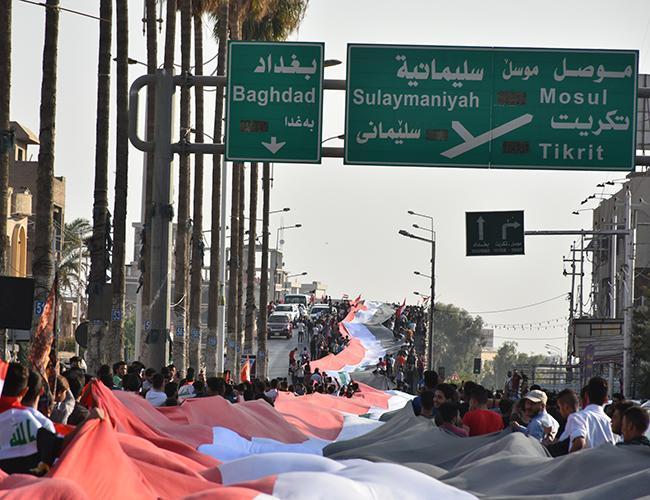
Iraqi pro-government paramilitaries launched an offensive against Kurdish troops on Oct. 24 near the Turkish frontier, pushing towards a strategic border crossing and oil export pipeline hub that Baghdad says must come under its control.
The Iraqi government has transformed the balance of power in the north of the country since launching a campaign last week to seize back territory from the Kurdistan Regional Government (KRG).
The Kurds held a referendum on independence on Sept. 25 that Baghdad called illegal. Baghdad responded by seizing back the city of Kirkuk, the oil-producing areas around it, and other territory that the Kurds had captured from Islamic State of Iraq and the Levant (ISIL).
Prime Minister Haider al-Abadi has ordered his army to recapture all disputed territory, and has also demanded central control of Iraq’s border crossings with Turkey, all of which are inside the Kurdish autonomous region itself.
A Kurdish official said Kurdish security forces known as peshmerga had successfully beaten back an advance by Iranian-backed pro-government paramilitaries in the region of Rabi’a, 40 kilometers of the Fish-Khabur border area.
Fish-Khabur is strategically vital because oil from both Kurdish and government-held parts of northern Iraq cross at a pipeline there into Turkey, the main route out of the area for international export, crucial for any Kurdish independence bid.
The fighting so far has taken place outside the Kurdish autonomous region, but Fish-Khabur is located within it, so any assault on the border crossing would mark a major escalation.
An Iraqi military spokesman denied there had been any clashes in the area. But an Iraqi security source in Baghdad and a rights activist in northwest Iraq said the confrontation had started at dawn and was still going on by midday.
“Peshmerga repelled the attack and pushed Popular Mobilization back in to Rabi’a,” tweeted KRG leader Masoud Barzani’s media advisor, Hemin Hawrami.
A military spokesman in Baghdad said in response: “There are no clashes.”
The fighting between the central government and the Kurds is particularly tricky for the United States which is close allies of both sides, arming and training both the Kurds and the central government’s army to fight against ISIL.
U.S. Secretary of State Rex Tillerson visited Baghdad this week, but Abadi rebuffed his call for Iraq to reject the role of Iran-backed paramilitaries that fight alongside government troops and have taken a hard line on the KRG.
On Oct. 23, a KRG security council official said Iraqi government forces and Popular Mobilization paramilitaries were deploying tanks and artillery in Rabi’a, northwest of Mosul.
An Iraqi government security advisor said on Oct. 23 Baghdad aimed to bring the three-way border crossing with Turkey and Syria at Fish-Khabur under its control, but he declined to say if a military move was being prepared.
The Syrian side of the border there is under the control of U.S.-backed Syrian Kurdish forces.
The Fish-Khabur crossing has been under effective Kurdish control since 1991, when the United States and western powers imposed a no-fly zone over northern Iraq to protect the Kurds from Saddam Hussein’s army.
The Iraqi government’s advance over the past week has been achieved with comparatively little violence, with the peshmerga mostly withdrawing without a fight.
Meanwhile, elections for the KRG presidency and parliament set for Nov. 1 have been delayed by eight months, the regional parliament announced on Oct. 24.
The decision came after the electoral commission said on Oct. 23 that political parties had failed to present candidates for both elections amid turmoil in the region.
The proposal to delay the two elections was approved by 60 of 68 MPs who attended the parliamentary session in Arbil, Rudaw TV said.
Eight MPs opposed the proposal and 43 didn’t attend, mainly politicians opposed to Barzani, one of the MPs said.